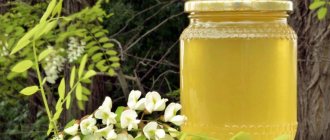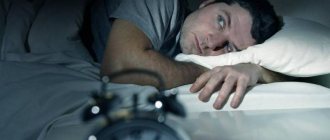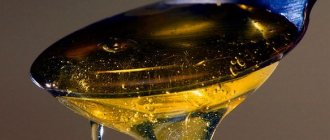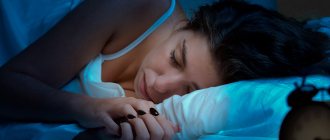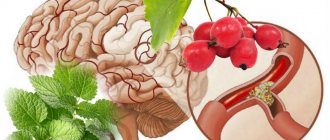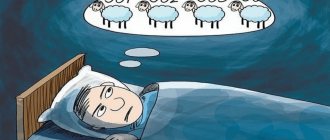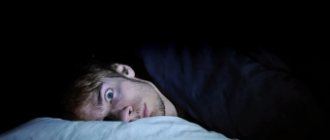Causes of insomnia
The main reasons for the development of insomnia are:
- stress, conflicts at work or in the family;
- moving, change of environment or time zone;
- fear and anxiety on the eve of an important event;
- taking drugs that stimulate the nervous system before bedtime;
- overeating before bed;
- bad habits (tobacco smoking, alcohol abuse);
- too cold or hot weather;
- uncomfortable bed;
- age (insomnia most often occurs in older people and preschool children);
- lack of indoor air;
- hereditary predisposition - if one of your close relatives suffers from insomnia, this increases the likelihood of developing the disease.
In addition, the cause of sleep disturbance can be pathological processes occurring in the patient’s body:
- disruption of the thyroid gland, which leads to hormonal imbalances;
- pregnancy;
- diseases of the nervous system;
- chest discomfort, heart pain;
- brain or spinal cord injuries;
- lack of air;
- severe toothache or headache;
- intoxication of the body;
- attacks of heartburn;
- urinary disorders and a number of others.
Symptoms of insomnia
In order not to trigger the disease and quickly take the necessary measures, you need to pay attention to the first signs of sleep disturbance:
- Constant problems falling asleep . A person goes to bed, everything seems to be in order, the bed is soft, the pillow is good, all the work is done, there is no worry. But for some reason sleep does not come and after a while the light drowsiness disappears, and all sorts of disturbing thoughts begin to come to mind.
- A person quickly falls asleep, but after a while he suddenly wakes up due to a nightmare or for another reason and cannot fall asleep again. As a result, he tosses and turns all night, looking for a comfortable position to sleep, and by the morning the result is the same - fatigue, irritability, weakness.
- A person falls asleep calmly, sleeps for 3-4 hours, and then wakes up and cannot sleep until the morning. A few hours of sleep is not enough for the body, so in the morning your health leaves much to be desired.
All of the above symptoms initially occur sporadically, but over time they appear more and more often and ultimately lead to the development of insomnia, which is accompanied by other neurological disorders.
The patient, experiencing constant problems with sleep, begins to change his behavior during the daytime hours. He is constantly in a bad mood, he feels weak and tired, his performance decreases, and nervous breakdowns occur.
Chronic insomnia reduces mental abilities . The body does not rest at night, so the patient is drawn to sleep during the daytime, which leads to impaired attention, decreased mental activity, concentration, and ability to remember. This leads to a drop in academic performance among schoolchildren and students, and a decrease in professional activity among adults.
Prolonged lack of sleep can lead to the development of depression over time, although it is often difficult to determine which is primary. Either insomnia led to the development of depression, or a depressive state caused problems with sleep.
It should be remembered that to get rid of insomnia, you should not immediately start taking strong sleeping pills . After all, they are addictive and even addictive. A person cannot fall asleep without another sleeping pill and over time, in order to fall asleep, he has to increase the dose.
General recommendations
Any sleep disturbance first affects a person’s mood and communication skills, he becomes irritable and aggressive. Over time, untreated insomnia leads to the formation of neurosis.
Circadian rhythm disorders can be treated with herbs only in cases where they are primary in nature, that is, they arise due to malfunction of the pineal gland or are associated with a nervous disorder. For diseases of internal organs, which also often causes insomnia, herbal medicine can be part of a comprehensive treatment of the underlying problem.
Diagnosis of insomnia
Diagnosis of the disease includes the following activities:
- assessment of the patient’s chronobiological type (is he a morning person or a night owl, how many hours of sleep does he need for proper rest);
- taking into account the peculiarities of culture and traditions in the patient’s place of residence (for example, in countries with hot climates, afternoon naps - siesta - are widespread);
- accounting for professional activities (for example, a person can work as a watchman at night or on a daily basis);
- psychological examination of the patient;
- polysomnographic study - is carried out to assess the structure of sleep and may include several techniques (electrooculography, electromyography, electroencephalography and a number of others).
Lavender oil repels insects
The scent of lavender is used in moth control products. You can use lavender essential oil at home. To do this, place lavender-scented napkins among the sweaters in your closet or chest of drawers. In addition, the oil helps with insect bites, relieves itching and inflammation.
In some countries, lavender oil is used in cooking, for example in France, although in our country it is more likely to be exotic. Lavender oil is good for long-distance flights. Take lavender oil in your hand luggage. It will help you keep a clear head and relieve fatigue. This humble plant is a real treasure. It’s not for nothing that lavender oil is called the first aid kit.
Watch the video. How lavender is harvested in the south of France. Lavender grows in warm climates.
If you liked the article, please like it. Just share with your friends on social networks. This will help us make the site better. Thank you!
Treatment of insomnia
First of all, the patient is recommended non-drug methods of treating insomnia . These include developing the habit of going to bed at the same time, methods of preparing for sleep (for example, going into the bedroom, unfolding the bed, closing the curtains tightly, lying down, relaxing, falling asleep), developing reflexes that lead to the onset of sleep.
In addition, various relaxation techniques are recommended that help a person relax, relieve excess excitement and prepare for sleep.
Various medications, both chemical and herbal, are used to treat insomnia. Natural preparations are the most popular because they have no side effects and are not addictive.
A good medicinal collection can not only save a person from sleep problems, but also cure a number of concomitant diseases.
As for chemical remedies for insomnia, they can only be prescribed by the attending physician, after a complete examination. The most commonly used drugs to treat insomnia are:
- barbiturates (Phenobarbital);
- benzodiazepine tranquilizers (Flurazepam, Quazepam);
- antidepressants (Doxepin, Amitriptyline);
- Z-hypnotics (Zolpidem, Zopiclone).
Herbs with hypnotic effects
Numerous trials have proven the effectiveness of medicinal herbs. People who regularly take herbal infusions also note that in addition to improving sleep and solving the problem of insomnia, they noticed that the feeling of internal restlessness disappeared and irritability decreased. So, we offer a list of herbs that have a hypnotic and sedative effect:
- Melissa
- calms the nervous system, reduces anxiety, relieves stress and helps the body relax, which is very important for sound sleep. - Fireweed
or
Ivan tea
is also popularly called “dremukha” for its rich composition: magnesium, B vitamins, flavonoids. All this is necessary for the healthy functioning of the nervous system. It is also known that it is a powerful antioxidant that can resist the destructive effects of stress, cancer, alcoholism and atherosclerosis. - Mint
is an herb that is great for calming, relieving stress and helping to relax. - Chamomile
(uterine grass, blush, camila, morgun) is an effective remedy for insomnia and depression, in addition, it has a beneficial effect on all organs and systems. - Oregano
(mother or zenovka) can soothe, normalize blood pressure and improve sleep. - Valerian
(frankincense, cat grass) - the plant has long been known for its properties to drive away melancholy, clarify thoughts and add strength. - Hop cones
have a hypnotic effect. - Thyme
is a herb that can relieve insomnia caused by physical or mental exhaustion and overwork. - Lavender
(colored grass, Indian spikelets, butterfly) is a powerful antidepressant that can improve mood and calm nerves. - Passionflower
- this plant can be found in many medicines. Coumarin in its composition has a positive effect on the nervous system. It also relieves motor restlessness, anxiety, and improves sleep quality.
Important!
Valerian contains more than a hundred biologically active components, which are actively used in the treatment of neuroses, depression, seizures, headaches and heart ailments.
All these plants help to normalize sleep and eliminate numerous reasons that prevent a person from falling asleep and fully resting: anxiety, irritability, pain, cramps, rapid heartbeat, negative thoughts, etc.
Treatment of insomnia with traditional methods
Insomnia greatly affects the immune system, physical and psycho-emotional state of a person . Its negative manifestations make themselves felt already in the first day without sleep. Sleeping pills seem like a quick and optimal way out of the situation, but they do not solve the essence of the problem. As soon as the period of their action passes, insomnia attacks with the same force.
Another unpleasant feature of drug treatment for insomnia is the addictive effect . It occurs quite quickly and the body waits for the next dose of sleeping pills as a command to go to sleep. This danger can be mitigated by using proven traditional methods of treating insomnia. They can be divided into three large groups: products based on medicinal herbs, delicious therapy using honey, and relaxing water treatments.
Therapeutic effect
Medicine has confirmed the positive calming effect on the human body of at least 10 herbs. Based on them, concentrates have been created (for example, valerian), widely used for various problems of the nervous system.
Taking soothing infusions and herbal decoctions gives a mild effect with a prolonged effect:
- excitability decreases on days 2-4;
- the emotional state stabilizes after 7-9 days;
- full sleep returns after 5-12 days.
In this case, there is no addiction (maintenance of concentration and frequency of administration!), there is no drowsiness during waking hours, and there are a small number of contraindications.
Decoctions and infusions of rhizomes, stems, flowers and fruits of medicinal plants
The compositions of the preparations include ingredients with pronounced sedative properties . They calm the nervous system, relieve stress and remove irritability. Regular intake of natural decoctions allows you to get rid of fearfulness and alleviate the condition of people with obsessive fears and phobias. Infusions prepared according to the following recipes can fully prepare the body for sleep :
- Motherwort five-lobed (3 parts), cudweed (3 parts), common heather (4 parts), valerian root (1 part). Pour a liter of boiling water over 4 tbsp. mixture, leave for 10-12 hours, strain. Take small sips every hour throughout the day.
- Peppermint leaves (1 part), hop heads (1 part), chamomile flowers (2 parts), lemon balm leaves (2 parts), valerian officinalis roots (2 parts), buckthorn bark (2 parts). Add 1 tbsp to 1 cup of boiling water. collection Take 1-2 glasses before bedtime.
- Veronica officinalis herb (1 part), fragrant violet herb (1 part), barberry fruits (1 part), lavender flowers (1 part), lemon balm leaves (1 part). 1 tbsp. pour a glass of boiling water over the mixture. Leave until completely cooled. Drink 1-2 glasses in the evening.
- Peppermint leaves (2 parts), lavender flowers (2 parts), valerian officinalis roots (3 parts), chamomile flowers (3 parts). Infuse 2 tbsp in a glass of boiling water. collection takes about 15 minutes. Drink in small sips throughout the day.
- Chamomile flowers (1 part), peppermint leaves (1 part), valerian officinalis roots (1 part), caraway fruits (1 part), fennel fruits (1 part). For 10 g of collection, pour 1 cup of boiling water. Infuse in a water bath, maintaining a boil for about half an hour. Cool (no more than 10 minutes) and strain. Squeeze out the sediment and dilute the resulting broth with boiled water to the volume of a full glass. Drink 1-2 glasses in the morning, 1 glass in the evening.
- Motherwort (5 g), thyme (5 g), calendula flowers (5 g). Boil 10 g of the mixture in 200 ml of water for 10-15 minutes. Leave for no more than 1 hour. Take 100 ml with honey before bed.
- Oregano herb (10 g), valerian roots (5 g). Boil 10 g of collection in 100 ml of water for 10-12 minutes. Leave for an hour. Drink 100 ml at night.
- Peppermint leaves (10 g), valerian roots (10 g), motherwort (10 g), mistletoe (10 g), hawthorn flowers (10 g). Infuse 1 tbsp in 200 ml of boiling water. collection within half an hour. Take 1 glass in the morning and evening.
- Peppermint leaves (20 g), valerian officinalis roots (10 g), hop cones (20 g), three-leaf watch (20 g). Infuse 1 tbsp for half an hour. mixture in 200 ml of boiling water. In the morning, afternoon and immediately before bed, take 100 ml.
- Peppermint leaves (30 g), motherwort (30 g), valerian officinalis roots (20 g), hop cones (20 g). Pour 10 g of collection with a glass of boiling water. Maintain a boil in a water bath for 15 minutes. Cool, strain and squeeze. Dilute with water to the original volume. Take half a glass of decoction three times a day.
One-ingredient recipes
If you have an individual intolerance to some of the ingredients in the preparations, you can use one-component products:
- Roots of valerian officinalis . Add 1 tbsp to 1 cup of boiling water. roots and boil for about 15 minutes. Leave for 10 minutes and strain. Take 1 tbsp. three times a day.
- Common oregano . Add a glass of boiling water to 2 teaspoons of herbs. Leave for 20 minutes. Drink the decoction warm, half a glass 3-4 times a day before meals.
- Red elderberry . Pour 1 tbsp with a glass of boiling water. elderberries. Boil for 15 minutes, leave for 30 minutes. Take 1 tbsp. 2-3 times a day.
- Hawthorn fruits . Add 2 tbsp to one and a half cups of boiling water. dry crushed fruits. Drink half a glass 3 times a day before meals (30 minutes before).
Lavender oil improves skin condition
Lavender oil is known for its antimicrobial properties. Lavender has a rich history of use to prevent infections and fight bacterial diseases. More than 100 studies have been conducted confirming the correctness of the ancient healers. Lavender oil accelerates the healing of burns, cuts, scrapes and wounds. The antimicrobial properties of lavender are enhanced when mixed with essential oils of clove, cinnamon and tea tree oil. To improve the condition of the skin, mix lavender oil with coconut oil in a ratio of 1:5. Essential oils should not be applied to deep wounds and cuts, or undiluted on the skin.
Want to reduce age spots? Try mixing lavender oil with frankincense oil and apply to problem areas of the skin in the morning, immediately after showering, and before bed. Two oils with a history of thousands of years of use, rejuvenate the skin and reduce the appearance of blemishes.
Honey therapy
A significant part of folk remedies for insomnia use honey as the main ingredient. This pleasant and useful product can be used in various combinations:
- Honey (1 tbsp), Borjomi mineral water (1 tbsp), finely chopped lemon (0.5 tbsp). Drink syrup in the morning.
- Honey (2 tbsp), lemon juice (1 glass), chopped walnuts (2 tbsp). Take before bedtime.
- Honey (1 tbsp), kefir (250 ml). Drink at night.
- Honey (200 g), apple cider vinegar (3 tsp). Eat 2 teaspoons of the product before bed.
Relaxing baths
Water procedures have a beneficial effect on the body , calm the nervous system and prepare a person for sleep. To properly use this method of combating insomnia, several rules should be followed:
- The optimal temperature is 36 degrees. The water in the bathroom should not heat up more than 40 degrees.
- The last meal before the procedure is 2 hours. The bath should also be taken 2 hours before bedtime.
- The duration of the procedure is 15-25 minutes.
- Water should not cover the surface of the chest (in the area of the heart), which can impede blood circulation.
- You can add decoctions of medicinal plants (valerian root, pine needles and pine cones, fragrant hay) to the water.
Lavender oil has antioxidant properties
Free radicals are a risk factor for every disease. Harmful chemicals, toxins, and air pollution weaken the immune system and harm health. When the body lacks its own antioxidants, natural sources come to the rescue.
Scientists in China discovered that lavender oil helps the body produce two powerful antioxidants, glutathione and catalase, within 22 hours of using lavender essential oil! Participants in the experiment inhaled the aroma of lavender for 60 minutes a day.
Lavender oil protects cells from free radical damage and reduces the risk of inflammation. A diffuser with natural lavender oil is a good and modern solution for your home or office.
Prevention of insomnia
The main measures to prevent insomnia are:
- refusal of daytime sleep;
- going to bed at the same time;
- refusal to sleep if you don’t feel like sleeping;
- avoidance of caffeinated drinks (especially in the evening);
- daily walks in the fresh air before bedtime;
- hardening the body, strengthening the immune system;
- physical activity, physical education;
- giving up bad habits (tobacco smoking, alcohol abuse);
- refusal of uncontrolled use of sleeping pills without a doctor’s prescription;
- creating comfortable conditions for falling asleep;
- avoiding stress;
- proper nutrition, avoidance of fast food and other junk food;
- weight control.
Attention! All materials published on our website are protected by copyright. When re-publishing, attribution and a link to the original source are required.
